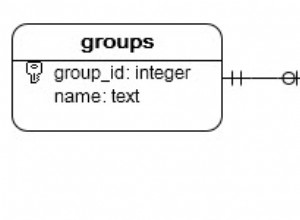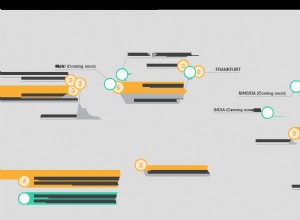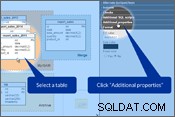मान लें कि आपके पास उत्पाद और श्रेणियां हैं। एक ग्राहक का कहना है कि 50 से अधिक रेटिंग मूल्य वाली श्रेणियों के लिए अन्य व्यावसायिक प्रक्रियाओं का उपयोग करना आवश्यक है। आपके पास एक ठोस अनुभव है और आप समझते हैं कि कल यह मान भिन्न हो सकता है - 127.37। जैसा कि आप इस स्थिति से बचना चाहते हैं, आप कोड को इस प्रकार लिखें:
public class Category : HasIdBase<int>
{
public static readonly Expression<Func<Category, bool>> NiceRating = x => x.Rating > 50;
//...
}
var niceCategories = db.Query<Category>.Where(Category.NiceRating);
दुर्भाग्य से, यह काम नहीं करेगा यदि आपको संबंधित श्रेणियों से उत्पादों का चयन करने की आवश्यकता है। नाइसरेटिंग में एक्सप्रेशन
इस प्रकार, हमें एक्सप्रेशन
public class Product: HasIdBase<int>
{
public virtual Category Category { get; set; }
//...
}
var niceProductsCompilationError = db.Query<Product>.Where(Category.NiceRating); सौभाग्य से, यह काफी आसान है!
// In fact, we implement a composition of statements,
// which returns the statement matching the composition of target functions
public static Expression<Func<TIn, TOut>> Compose<TIn, TInOut, TOut>(
this Expression<Func<TIn, TInOut>> input,
Expression<Func<TInOut, TOut>> inOutOut)
{
// this is the X parameter => blah-blah. For a lambda, we need null
var param = Expression.Parameter(typeof(TIn), null);
// we get an object, to which this statement is applied
var invoke = Expression.Invoke(input, param);
// and execute “get an object and apply its statement”
var res = Expression.Invoke(inOutOut, invoke);
// return a lambda of the required type
return Expression.Lambda<Func<TIn, TOut>>(res, param);
}
// add an “advanced” variant of Where
public static IQueryable<T> Where<T, TParam>(this IQueryable<T> queryable,
Expression<Func<T, TParam>> prop, Expression<Func<TParam, bool>> where)
{
return queryable.Where(prop.Compose(where));
}
// check
[Fact]
public void AdvancedWhere_Works()
{
var product = new Product(new Category() {Rating = 700}, "Some Product", 100500);
var q = new[] {product}.AsQueryable();
var values = q.Where(x => x.Category, Category.NiceRating).ToArray();
Assert.Equal(700, values[0].Category.Rating);
}
यह LinqKit में स्टेटमेंट कंपोजिशन का कार्यान्वयन है। हालांकि, एंटिटी फ्रेमवर्क InvokeExpression के साथ काम नहीं करता है और NotSupportedException को फेंक देता है। क्या आप जानते हैं कि LINQ में कमियां हैं? इस प्रतिबंध के आसपास काम करने के लिए, लिंककिट में हम एक विस्तार विधि AsExpandable का उपयोग करते हैं। पीट मोंटगोमरी ने अपने ब्लॉग में इस मुद्दे का वर्णन किया है। प्रेडिकेट बिल्डर का उनका संस्करण IEnumerable
यहाँ कोड इस प्रकार है।
public static class PredicateBuilder
{
/// <summary>
/// Creates a predicate that evaluates to true.
/// </summary>
public static Expression<Func<T, bool>> True<T>() { return param => true; }
/// <summary>
/// Creates a predicate that evaluates to false.
/// </summary>
public static Expression<Func<T, bool>> False<T>() { return param => false; }
/// <summary>
/// Creates a predicate expression from the specified lambda expression.
/// </summary>
public static Expression<Func<T, bool>> Create<T>(Expression<Func<T, bool>> predicate) { return predicate; }
/// <summary>
/// Combines the first predicate with the second using the logical "and".
/// </summary>
public static Expression<Func<T, bool>> And<T>(this Expression<Func<T, bool>> first, Expression<Func<T, bool>> second)
{
return first.Compose(second, Expression.AndAlso);
}
/// <summary>
/// Combines the first predicate with the second using the logical "or".
/// </summary>
public static Expression<Func<T, bool>> Or<T>(this Expression<Func<T, bool>> first, Expression<Func<T, bool>> second)
{
return first.Compose(second, Expression.OrElse);
}
/// <summary>
/// Negates the predicate.
/// </summary>
public static Expression<Func<T, bool>> Not<T>(this Expression<Func<T, bool>> expression)
{
var negated = Expression.Not(expression.Body);
return Expression.Lambda<Func<T, bool>>(negated, expression.Parameters);
}
/// <summary>
/// Combines the first expression with the second using the specified merge function.
/// </summary>
static Expression<T> Compose<T>(this Expression<T> first, Expression<T> second, Func<Expression, Expression, Expression> merge)
{
// zip parameters (map from parameters of second to parameters of first)
var map = first.Parameters
.Select((f, i) => new { f, s = second.Parameters[i] })
.ToDictionary(p => p.s, p => p.f);
// replace parameters in the second lambda expression with the parameters in the first
var secondBody = ParameterRebinder.ReplaceParameters(map, second.Body);
// create a merged lambda expression with parameters from the first expression
return Expression.Lambda<T>(merge(first.Body, secondBody), first.Parameters);
}
class ParameterRebinder : ExpressionVisitor
{
readonly Dictionary<ParameterExpression, ParameterExpression> map;
ParameterRebinder(Dictionary<ParameterExpression, ParameterExpression> map)
{
this.map = map ?? new Dictionary<ParameterExpression, ParameterExpression>();
}
public static Expression ReplaceParameters(Dictionary<ParameterExpression, ParameterExpression> map, Expression exp)
{
return new ParameterRebinder(map).Visit(exp);
}
protected override Expression VisitParameter(ParameterExpression p)
{
ParameterExpression replacement;
if (map.TryGetValue(p, out replacement))
{
p = replacement;
}
return base.VisitParameter(p);
}
}
}




